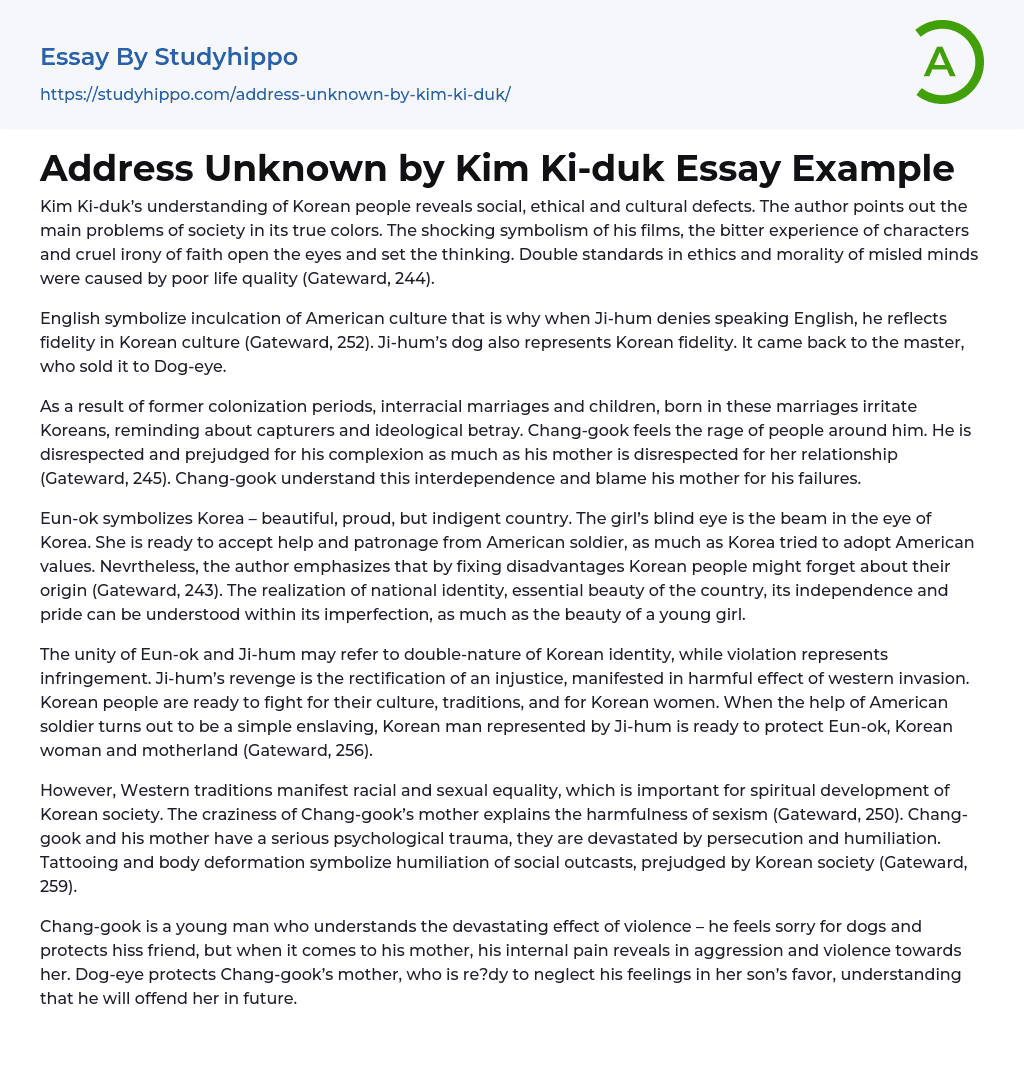Kim Ki-duk’s understanding of Korean people reveals social, ethical and cultural defects. The author points out the main problems of society in its true colors. The shocking symbolism of his films, the bitter experience of characters and cruel irony of faith open the eyes and set the thinking. Double standards in ethics and morality of misled minds were caused by poor life quality (Gateward, 244).
English symbolize inculcation of American culture that is why when Ji-hum denies speaking English, he reflects fidelity in Korean culture (Gateward, 252). Ji-hum’s dog also represents Korean fidelity. It came back to the master, who sold it to Dog-eye.
As a result of former colonization periods, interracial marriages and children, born in these marriages irritate Koreans, reminding about capturers and ideological betray. Chang-gook feels the rage of people around him. He is disrespe
...cted and prejudged for his complexion as much as his mother is disrespected for her relationship (Gateward, 245). Chang-gook understand this interdependence and blame his mother for his failures.
Eun-ok symbolizes Korea – beautiful, proud, but indigent country. The girl’s blind eye is the beam in the eye of Korea. She is ready to accept help and patronage from American soldier, as much as Korea tried to adopt American values. Nevrtheless, the author emphasizes that by fixing disadvantages Korean people might forget about their origin (Gateward, 243). The realization of national identity, essential beauty of the country, its independence and pride can be understood within its imperfection, as much as the beauty of a young girl.
The unity of Eun-ok and Ji-hum may refer to double-nature of Korean identity, while violation represents infringement. Ji-hum’s revenge is the rectification
of an injustice, manifested in harmful effect of western invasion. Korean people are ready to fight for their culture, traditions, and for Korean women. When the help of American soldier turns out to be a simple enslaving, Korean man represented by Ji-hum is ready to protect Eun-ok, Korean woman and motherland (Gateward, 256).
However, Western traditions manifest racial and sexual equality, which is important for spiritual development of Korean society. The craziness of Chang-gook’s mother explains the harmfulness of sexism (Gateward, 250). Chang-gook and his mother have a serious psychological trauma, they are devastated by persecution and humiliation. Tattooing and body deformation symbolize humiliation of social outcasts, prejudged by Korean society (Gateward, 259).
Chang-gook is a young man who understands the devastating effect of violence – he feels sorry for dogs and protects hiss friend, but when it comes to his mother, his internal pain reveals in aggression and violence towards her. Dog-eye protects Chang-gook’s mother, who is re?dy to neglect his feelings in her son’s favor, understanding that he will offend her in future. She is the nameless woman, who obeys (Gateward, 248).
This triangle of selective compassion and violence reveals misapprehension of ethical values and hysteria of offended people. Dog-eye tries to be a father for Chang-gook in a certain way, whereas Chang-gook rejects his mother and her friend due to their immorality, consequently, the acts of violence toward his mother and Dog-eye’s homicide were presented as a salvation and cleansing. The actions of Chang-gook’s mother after finding his body are the result of madness and rejection (Gateward, 259).
The film reveals uncertainties in Korean identity, double standards and personal integrity. Prejudice ruins people without
giving them the chance to live in tolerant society. Korean culture and history could be lost in Western enthrallment. Nevertheless, Kim Ki-duk considers American tolerance as a virtue that is missing in Korean scale of values. The misapprehended hierarchy of ethical values is crucial for Kim Ki-duk’s characters. Conservative society and poor life quality ruin the only chance to follow American dream, preserving Korea in people’s hearts.
- Values of Life essays
- Ethical dilemma essays
- Normative Ethics essays
- Virtue Ethics essays
- Belief essays
- Deontology essays
- Moral essays
- Virtue essays
- Work Ethic essays
- Media Violence essays
- Domestic Violence essays
- Violence in Video Games essays
- Gun Violence essays
- Video Game Violence essays
- Violence Against Women essays
- Youth Violence essays
- Acceptance essays
- Age Of Enlightenment essays
- Child Observation essays
- Confucianism essays
- Conscience essays
- Critical Reflection essays
- Destiny essays
- Determinism essays
- Empiricism essays
- Environmentalism essays
- Epistemology essays
- Ethics essays
- Ethos essays
- Existence essays
- Existentialism essays
- Fate essays
- Free Will essays
- Functionalism essays
- Future essays
- Good And Evil essays
- Human Nature essays
- Individualism essays
- Meaning Of Life essays
- Metaphysics essays
- Natural Law essays
- Personal Philosophy essays
- Philosophers essays
- Philosophy Of Life essays
- Political Philosophy essays
- Pragmatism essays
- Reality essays
- Relativism essays
- Teaching Philosophy essays
- Time essays




